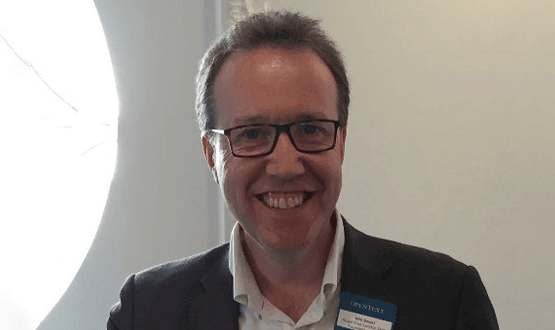Outgoing NHS England CIO reflects on three-year national role
- 19 July 2019

Will Smart struck a sanguine tone at the Digital Health Summer Schools as he reflected on his past three years as NHS England’s chief information officer.
The outgoing executive, due to formally leave his role at the end of September, said it was fitting to be standing before delegates at the University of Leeds, three years after he spoke at Summer Schools for the first time after being appointed CIO.
He credited peers for the work they had achieved in this time, saying: “Everything we’ve achieved over the past three years is not what we’ve done centrally, but about what you’ve done locally – all credit is all yours.”
Smart remarked that focusing on local delivery was where the biggest strides had been made – as well as where most of his battles had been fought.
“If I’ve tried to do one thing that I’ve been true to is [the notion of] where the patient is, is where the action is,” he said.
“How do we support local in deliverly? I’ve had fights about where the money should go and local is where the vast majority should be.”
One topic that continues to permeate the health IT space is the role that chief information officers (CIOs), chief clinical information officers (CCIOs) and chief nursing information officers (CNIOs) should play – particularly whether they should sit on the board alongside other executives and directors.
Smart offered: “To me, there’s no debate about whether CIOs should be on the board…If any CIOs think they shouldn’t be on the board, they should probably haven’t made the correct career choice.”
However, Smart said he saw the CIO as a figure that should act as the “bridge” between the “physical world and the digital world”.
He added: “That is the most valuable thing that anyone in an organisation can to: bridge that gap between the technology and the patients”.
Smart reflected on his own unorthodox career path to becoming a CIO, which included a failed attempt at the clergy – a particularly interesting choice, he pointed out, as a self-confessed atheist.
Yet Smart said it was crucial that people who wanted to become CIOs should have clear career paths presented for them.
He also urged CIOs, CCIOs and CNIOs to be more vocal about their successes, and underlined the importance of networking opportunities.
“We need to stand tall and say, ‘We are professional people that have expertise in these domains and you should listen to us, because we know what we’re talking about,” Smart said.
“Technology is a team sport – one thing that I’ve seen become a success over past three years is that we’ve got CIOs talking together and solving things together and doing things at scale.
“We don’t need to reinvent a solution in every organisation. We should shamelessly steal from everyone who has already done it. Network, and keep talking to each other.”
Smart concluded: “I have lots of hobby horses. I think we talk too much about leadership generally. Actually, the skill for a great CIO is to know when to lead and when to follow.
“I think we should be talking much more about ‘followship’ in the CIO community. It’s not always about leading, but about doing the right thing when we should.”





1 Comments
Part of the problem seems to be that people (including politicians and the BBc) conflate “NHS England” with “the NHS in England”.
The NHS England website states “NHS England leads the National Health Service (NHS) in England”.
This is at odds with the http://www.gov.uk website which describes NHS England as the body which “authorises the new clinical commissioning groups, which are the drivers of the new, clinically-led commissioning system introduced by the Health and Social Care Act. Prior to 1 April 2013 … NHS England is an executive non-departmental public body, sponsored by the Department of Health and Social Care.”
NHS England, along with the CCGs are the Commissioners, Trusts and General practices are the Providers. PM Thatcher deliberately set up Trusts as independent entities – the advent of Foundation Trusts took this independence from the Secretary of Sate a stage further.
In Will’s tweet he talked of “Ending my time as national CIO” – that was not his role, he was CIO of NHS England there is no post of National CIO.
This may seem pedantic but until people like Matt Hancock and Will Smart understand the way the NHS is constituted, we seem doomed to repeat past mistakes such as NPfIT and Care.Data.
Comments are closed.